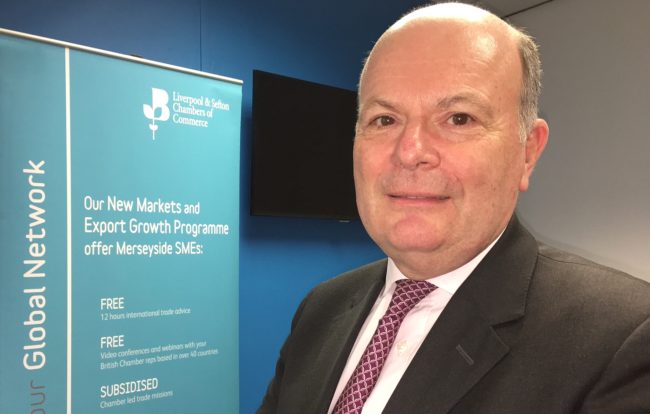Liverpool & Sefton Chamber’s new chair says helping firms through Brexit is a top priority
Neil Ashbridge worked for the Bank of England in Liverpool from 1992 until his retirement in June 2015, having previously worked at the Bank’s London headquarters in Threadneedle Street. Tony McDonough reports.

With Britain set to begin negotiations on its withdrawal from the European Union, the role of chambers of commerce as the “authentic voice of business” has never been more important.
So it is perhaps fitting during such an historic period that Liverpool & Sefton Chamber’s new chair brings such a wealth of knowledge and experience on the micro and macro views of the economy.
Neil Ashbridge worked for the Bank of England in Liverpool from 1992 until his retirement in June 2015, having previously worked at the Bank’s London headquarters in Threadneedle Street.
The role of the Bank’s regional offices is to maintain a continual dialogue with businesses large and small to offer an accurate picture of how businesses are faring.
Neil was elected as chair of the chamber in December 2016, replacing John Sutcliffe. Mr Sutcliffe, a well known and popular figure in the local business world, sadly passed away in January.
Changing landscape
In his first interview as chair Neil said the financial crisis of 2008/09 had significantly changed the landscape for chambers.
“We are at a crossroads and that is driven primarily by the effects the financial crisis, which has meant the public sector has had to get to grips with a dramatic change in its finances,” he said.
“For chambers this means there are diminishing opportunities to bid for public sector contracts.

“The other thing facing business now is Brexit and at the moment we are not certain of the shape of that.
“But I think that chambers are in a position to be able to help businesses get through that and influence Government on the terms of our departure from the EU and our economic relations with Europe thereafter.”
Staying independent
There are other chambers in the region that have allied themselves closely with local authorities. However, Liverpool & Sefton Chamber has maintained its independence. Neil believes this is a real strength.
He explained: “The chamber can be the authentic face of business because it has no conflict of interest and can therefore collaborate and converse with the public sector, which is very important, because we need to engage with local authorities and the Local Enterprise Partnership.
“But, at the same time, we are independent of those bodies which makes us a partner rather than an offshoot.”
Skill set
Yorkshire-born Neil’s links with the chamber go back many years. He maintained a dialogue with the organisation throughout his time at the Bank of England and, in the late 1990s into the 2000s, he was a board member.
“The skill set that I developed during my time at the bank was about engaging with businesses of all sizes and in all sectors,” he said.
“And something that is very unique about the chamber is that it is the same – its businesses are members large and small.”
Five-year plan
His principle role as chair will be to help the chamber formulate a strategy to take it forward for the next five years and advise on its implementation over that period.
Said Neil: “That plan will be built around the chamber’s USPs, which are very much around the brand – the chamber has a very strong brand.
“It has tradition, it is trusted and its membership is large and diverse.
“A key part of that strategy is to make sure the focus is on the members – without them we cannot be the authentic voice of business.
“One of the strings to the chambers bow is the data collated from its members and how it enables us to understand what businesses want.
“What is also very important is the international element. Chambers have traditionally had a significant role in international trade.
“Chambers do the export credits for businesses. We train and advise businesses on international trade and we can also build useful links through the global chamber network.”
